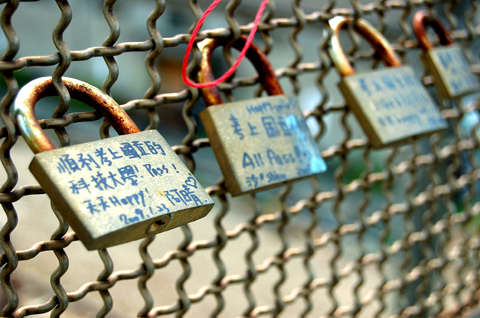Residents of Fengyuan (豐原), Taichung County, are making wishes by hanging padlocks on a wire mesh fence at a pedestrian overpass by the city’s train station.
Train station director Lin Ching-shan (林景山) said that despite the fact that overpasses exist at many train stations around the country, to his knowledge, this phenomenon is unique to Fengyuan.
It all began about five years ago when someone observed a few padlocks hanging on the fence with wishes written on them in Chinese and an unidentified foreign language, he said. Before long, the padlocks were known as “wish locks.”

PHOTO: CHANG JUI-CHEN, TAIPEI TIMES
Lin said some people believe the trains generate a magnetic field when they pass under the overpass and the energy that accumulates in the locks will fulfill their wishes. Although authorities have cleared the fence on several occasions, new padlocks keep turning up, Lin said.
The wishes written on the padlocks include: “[I wish to] successfully pass university entrance exams,” “I want happiness” and “[give me] eternal love.”
Sometimes two padlocks are locked together or hung close to each other. These are known as “heart locks,” and are normally hung by lovers.
One lock hung by someone looking for a partner had the wish “Be with me!” written on it. Other examples are “I want money” and “[Let’s] go to National Taiwan University together. We want to move in together.”
The overpass in Fengyuan has attracted students from all over Taiwan, who go to read the padlocks, developing into a youth tourist spot, Lin said.
Folklore specialist Chang Yi-ming (張益銘) said the phenomenon may be an imitation of youth subcultures developed from faith practices in other countries, adding that a magnetic field would imply that the place has a lot of energy.
Whether that energy is beneficial or not is for people to decide on their own, he said.

Taiwan is stepping up plans to create self-sufficient supply chains for combat drones and increase foreign orders from the US to counter China’s numerical superiority, a defense official said on Saturday. Commenting on condition of anonymity, the official said the nation’s armed forces are in agreement with US Admiral Samuel Paparo’s assessment that Taiwan’s military must be prepared to turn the nation’s waters into a “hellscape” for the Chinese People’s Liberation Army (PLA). Paparo, the commander of the US Indo-Pacific Command, reiterated the concept during a Congressional hearing in Washington on Wednesday. He first coined the term in a security conference last

A magnitude 4.3 earthquake struck eastern Taiwan's Hualien County at 8:31am today, according to the Central Weather Administration (CWA). The epicenter of the temblor was located in Hualien County, about 70.3 kilometers south southwest of Hualien County Hall, at a depth of 23.2km, according to the administration. There were no immediate reports of damage resulting from the quake. The earthquake's intensity, which gauges the actual effect of a temblor, was highest in Taitung County, where it measured 3 on Taiwan's 7-tier intensity scale. The quake also measured an intensity of 2 in Hualien and Nantou counties, the CWA said.

The Overseas Community Affairs Council (OCAC) yesterday announced a fundraising campaign to support survivors of the magnitude 7.7 earthquake that struck Myanmar on March 28, with two prayer events scheduled in Taipei and Taichung later this week. “While initial rescue operations have concluded [in Myanmar], many survivors are now facing increasingly difficult living conditions,” OCAC Minister Hsu Chia-ching (徐佳青) told a news conference in Taipei. The fundraising campaign, which runs through May 31, is focused on supporting the reconstruction of damaged overseas compatriot schools, assisting students from Myanmar in Taiwan, and providing essential items, such as drinking water, food and medical supplies,

New Party Deputy Secretary-General You Chih-pin (游智彬) this morning went to the National Immigration Agency (NIA) to “turn himself in” after being notified that he had failed to provide proof of having renounced his Chinese household registration. He was one of more than 10,000 naturalized Taiwanese citizens from China who were informed by the NIA that their Taiwanese citizenship might be revoked if they fail to provide the proof in three months, people familiar with the matter said. You said he has proof that he had renounced his Chinese household registration and demanded the NIA provide proof that he still had Chinese